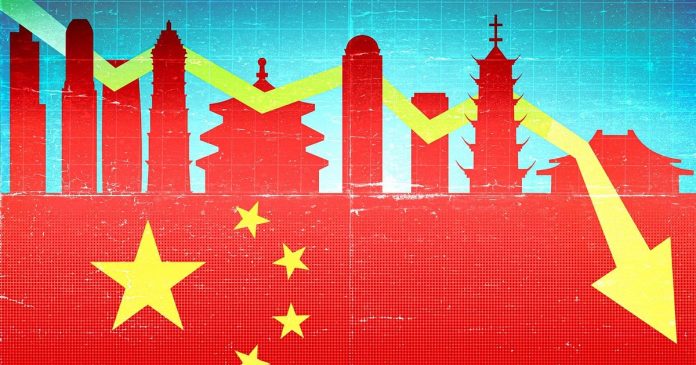China’s economy, once hailed as the engine of global growth, is now facing a serious crisis that threatens its stability and prosperity. China’s economic woes are not merely the result of external shocks or cyclical fluctuations, but rather the consequence of its own flawed policies and practices. China’s economic crisis is a self-inflicted wound that exposes the limits and risks of its authoritarian and state-led development model.
China’s economic crisis has multiple dimensions and causes. One of the most visible and alarming aspects is the debt crisis that has engulfed its property sector, epitomized by the collapse of Evergrande, the country’s largest real estate developer. Evergrande, which owes more than $300 billion to various creditors, has been unable to service its debt obligations and has defaulted on several bond payments. Its failure has triggered a domino effect that has affected other property developers, banks, investors, suppliers, contractors, and homebuyers, creating a systemic risk for the entire financial system.
The root cause of China’s debt crisis is the excessive reliance on credit-fueled investment and consumption, especially in the real estate sector, which accounts for about a quarter of China’s GDP. For years, China has been stimulating its economy by pumping cheap and abundant credit into the market, creating an artificial demand and a massive bubble in the property market. The government has also encouraged and subsidized the expansion of the property sector, as it generates tax revenues, employment, and social stability. However, this strategy has also created a huge imbalance and distortion in the economy, as it has crowded out more productive and innovative sectors, and has resulted in a massive waste of resources, overcapacity, and environmental degradation.
China’s debt crisis is also a reflection of its political and institutional crisis. The lack of transparency, accountability, and rule of law in China’s financial system has enabled rampant corruption, fraud, and mismanagement in the property sector. Evergrande, for instance, has been accused of engaging in illegal fundraising, falsifying financial statements, bribing officials, and defrauding customers. The government, which has ultimate control and oversight over the financial system, has failed to prevent and regulate these malpractices, and has instead protected and bailed out the vested interests and cronies in the property sector. The government has also failed to implement meaningful reforms and deleveraging measures, as it fears the social and political backlash that could result from a slowdown or a crash in the property market.
China’s economic crisis is not only confined to the debt and property sectors, but also extends to other areas, such as trade, technology, and innovation. China’s trade surplus, which has been one of the main drivers of its economic growth, is under threat from the rising protectionism and geopolitical tensions with its major trading partners, such as the US, the EU, and Australia. China’s access to critical technologies and markets is also being restricted and challenged by the US-led sanctions and decoupling efforts, which aim to curb China’s technological and military rise. China’s innovation capacity, which is essential for its economic upgrading and competitiveness, is also hampered by its rigid and repressive political system, which stifles creativity, diversity, and openness.
China’s economic crisis poses a serious challenge and a dilemma for its leadership, which has staked its legitimacy and authority on delivering economic growth and prosperity. On the one hand, the government faces the urgent need and the public pressure to address and resolve the economic crisis, by providing relief and support to the affected stakeholders, and by implementing structural reforms and adjustments to rebalance and diversify the economy. On the other hand, the government faces the risk and the fear of losing control and stability, as any drastic or hasty intervention or reform could trigger a deeper and wider crisis, and could unleash social unrest and political dissent. The government also faces the resistance and the opposition from the powerful and entrenched interests and factions within the party and the state, who benefit from the status quo and who oppose any change or challenge to their privileges and influence.
China’s economic crisis is a critical juncture and a test for its development model and its future trajectory. How the government responds and reacts to the crisis will have significant implications and consequences for China and the world. Will China be able to overcome its economic crisis and emerge stronger and more resilient, or will it succumb to its economic crisis and descend into chaos and decline? Will China be able to reform and transform its economy and its society, or will it cling to its old and outdated policies and practices? Will China be able to cooperate and integrate with the international community, or will it isolate and confront the rest of the world? These are the questions and the choices that China faces in the midst of its economic crisis.


